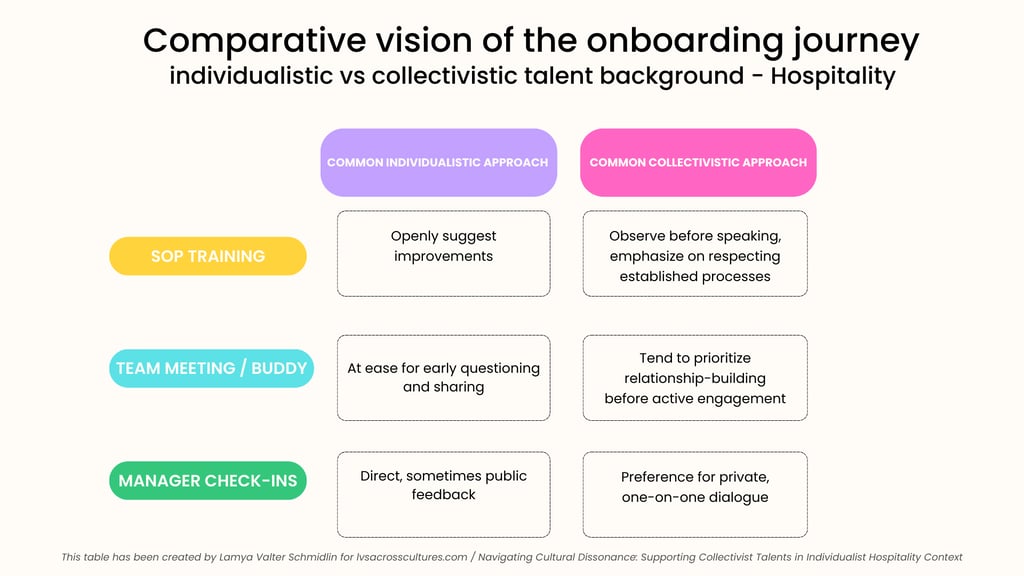Exploring Cultural Dissonance: Supporting Collectivist Talents in Individualistic Hospitality Environment
This article explores how cultural differences impact everyday practices in hospitality contexts. Using the Netherlands as a key example of an individualist culture with egalitarian traits, and drawing comparisons with collectivist societies such as Morocco, Turkey, and Spain, the article highlights how these cultural patterns can influence onboarding, recognition, feedback, and accountability from the talent perspective. Through scenarios and research based on the Hofstede cultural dimension model, it offers practical guidance for HR, L&D professionals, and team leaders navigating the complexities of cross-cultural team dynamics.
HUMAN RESSOURCESHOSPITALITYCROSS-CULTURAL MANAGEMENTCROSS-CULTURAL
Lamya Valter Schmidlin
9/21/20256 min read


In hotels, restaurants, and service organisations, it is very common to find teams coming come from diverse national, linguistic, and cultural backgrounds. Each talent brings their own values, work habits, and expectations. This is particularly visible in countries like the Netherlands, where hospitality workplaces are home to a significant number of expats. In cities such as Amsterdam, Rotterdam or The Hague, hotels regularly hire international employees from countries including Turkey, Poland, Italy, Morocco or Spain*.
Many of these team members come from collectivist cultures, where harmony, group loyalty, and indirect communication are deeply valued. In contrast, Dutch workplace culture (as measured by Hofstede’s framework) is among the most individualistic in the world, emphasizing personal initiative, directness, and self-reliance. Combined with typically flat hierarchies, this creates a unique work environment, collaborative in structure, yet guided by individual performance and open feedback.
For new employees arriving from more hierarchical or relationship based cultures, this environment can be both refreshing and disorienting. Expectations around leadership, recognition, and accountability can feel unfamiliar, or even in tension with their professional instincts.
For HR managers, hotel manager, and L&D professionals, these contrasts show up daily in team dynamics and in onboarding, coaching, and performance reviews. Successfully managing talent across these cultural lines requires awareness and demands practical, flexible approaches that respect both the individual and the collective.
Culture in context: the individual and the group
A dimension widely used in cross-cultural research is individual-collectivism. At its core, Hofstede’s individualism-collectivism scale measures how people define themselves, as individuals or as part of a group. The higher number on the scale, the more individualist. Here is a succinct summary:
Individualistic cultures, like the U.S. (91), the UK (89), The Netherlands (80) tend to value independence, personal responsibility, and self-direction. People are “I” conscious, intellectual autonomy encourages individuals to pursue their own ideas. There is more explicit, verbal communication.
Collectivist cultures, like Turkey (37), Morocco (46) (Argentina (46) or Spain (51), place greater emphasis on loyalty, group harmony, and shared success. People are “we” conscious, their identity is based on the social system. Harmony with in-group members and loss of face is important, resulting in preference for indirect communication.
However, it’s not simply binary as cultures express these values in different ways alongside other cultural dimensions. For example, although the Netherlands scores high on individualism, it is also known for flat hierarchies, collaborative decision-making, and a preference for modesty rather than self-promotion. In contrast, collectivist cultures like Argentina may encourage warm interpersonal dynamics and loyalty, yet also rely on stronger hierarchies and deference to authority.
In hospitality, where diverse teams work under pressure, often in fast-paced environments, these cultural differences shape how the talents hold different assumptions about leadership, recognition, feedback, and accountability, when working side by side.
Onboarding: navigating cultural expectations
Cultural differences often become apparent early in the onboarding journey, influencing how new talents engage and integrate into their teams. Yet, it is important to recognize that these dynamics can also vary significantly depending on the specific company culture and leadership style.
In most organisations from Individualistic societies, new hires are encouraged and used to share feedback and contribute to ideas at the very beginning of their new journey. Open communication and proactive involvement are generally valued as indicators of engagement and readiness to take initiative.
By contrast, employees from collectivist cultures may initially take a more cautious approach. Their focus tends to be on observing group dynamics, building relationships, and demonstrating respect for hierarchy or seniority before actively participating. For some, early assertiveness in group settings may feel inappropriate or premature. Talents often expect feedback and dialogue checking-in on their new professional adventure to be conducted in private, one-on-one conversations, which can differ from more direct or public feedback styles.


Example: a receptionist from Turkey begins her role at a hotel in Rotterdam. Initially, she observes carefully and adheres strictly to procedures without volunteering suggestions. While her Dutch manager might interpret this as reserved engagement, cultural awareness and contextual understanding reveal it as a respectful and relationship-oriented approach. A private one-on-one meeting later facilitates meaningful dialogue and helps build trust.
Both cultural approaches value professionalism and initiative, but the form and timing of communication may differ. Successful onboarding respects these nuances and adapts to the company’s culture while supporting new hires in finding their voice and place within the team.
Recognition and motivation: who gets credit and how?
How achievements are recognised can have a profound impact on motivation and team dynamics.
In individualist environments, recognition often shines a spotlight on individual accomplishments. Even within teams, rewards and praise tend to highlight personal contributions. However, in Dutch organizations, this individual focus is balanced with a cultural preference for modesty. Open self-promotion is usually discouraged, even when someone’s performance truly stands out. Instead, recognition tends to be more subtle, collective, and low-key.
On the other hand, in many collectivist cultures, success is naturally celebrated as a team achievement. Singling out individuals for praise can sometimes feel uncomfortable or risk unsettling group harmony. Managers often prefer to acknowledge the whole team, reflecting the belief that every member’s contribution matters and that maintaining cohesion is key.
Example: In a hotel in Amsterdam, a North-American intern is praised during a team debrief for improving check-in procedures. The Dutch manager chooses to credit the entire team rather than singling out the intern. While the intern (accustomed to more direct, personal recognition) might feel overlooked, a colleague from Spain or Morocco may find this group-focused praise more respectful and motivating.
Understanding these subtle differences helps create a workplace where everyone feels valued in a way that resonates personally, where motivation blooms naturally.
Feedback and development: directness, equality and cultural filters
How people grow in their roles is deeply connected to how they receive feedback and take on development opportunities.
In individualist cultures, feedback is often direct and task-focused, and personal development is usually seen as a personal responsibility. In the Netherlands, this plays out with a twist: feedback is expected to be open, honest, and constructive, but always within a culture of equality. Managers act more like facilitators than bosses, and employees are encouraged to share their own feedback upward.
In more collectivist settings, such as Argentina or Spain, feedback may be given more tactfully to avoid causing embarrassment or disrupting relationships. Development is often guided through mentorship or senior leadership, with more formality and hierarchy.
Example: A Dutch hotel manager might give straightforward feedback during a team meeting, including to junior staff, and expect an open discussion. In Argentina, the same conversation would likely happen one-on-one, with careful attention to tone and timing.
Accountability: who owns mistakes and success?
How responsibility is assigned and how blame is handled can vary sharply across cultures.
In individualist contexts, employees are expected to own their successes and failures. Yet in Dutch workplaces, that ownership is balanced with a strong culture of trust and collective responsibility. Mistakes are discussed openly but without assigning shame; the goal is to learn.
In collectivist environments, accountability may be seen as shared, especially within tight-knit teams. Managers often take responsibility on behalf of their group to preserve harmony. However, hierarchy may play a stronger role in how decisions and errors are handled.
Example: If a reservation error affects a guest, a Dutch hotel might hold a team debrief to identify what went wrong, focusing on systems rather than people. In a Italian or Morrocan hotel, the manager might take the lead in resolving the issue directly with the guest and only later speak privately with the team involved.
__
To build inclusive, high-performing environments, leaders can take practical steps such as embracing cultural intelligence by openly learning about it, designing recognition that feels right by adopting a combined approach, and offering flexible development paths as navigating between self-directed learning for some and more structured guidance for others.
In hospitality, cultural differences are felt in every guest interaction, team project, or performance review. Leading a team in Amsterdam, Istanbul, Buenos Aires, or Barcelona may not always be about applying rigid frameworks, but perhaps about being mindful of the cultural patterns that shape individual talents. When leaders are able to navigate these differences and thoughtfully connect them to the core values of the company, it can open up opportunities for more meaningful and effective collaboration.
*https://opendata.cbs.nl/#/CBS/en/dataset/85469ENG/table?searchKeywords=immigrant
Below are the references of the books/ Academic articles I have read to write this article:
Hennekam, Sophie & Tahssain, Loubna. (2015). Changing attitudes towards diversity: The Netherlands and Morocco compared. Management Decision. 53. 10.1108/MD-04-2015-0119.
De Mooij, M. (2019). Global Marketing and Advertising: Understanding Cultural Paradoxes (5th ed.). SAGE Publications.
Geert Hofstede, Gert Jan Hofstede, Michael Minkov. Cultures and Organizations: Software of the Mind – Intercultural Cooperation and Its Importance for Survival. 3rd edition. New York: McGraw-Hill, 2010.
Thank you for reading.
Lamya
A morning delight in Amsterdam, captured by Lamya Valter Schmidlin
LVS *AC
Cross-cultural guest experience research
contact
lamya@lvsacrosscultures.com
© 2026. LVS AC - All rights reserved.
